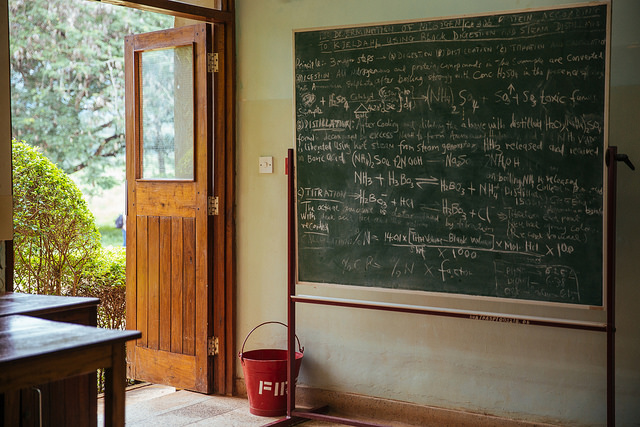IFPRI’s recent 40th anniversary provides an opportunity to take stock of our policy influence and impact over the years. Has IFPRI been a worthwhile undertaking? What does available evidence tell us about IFPRI’s impact on food policies? How can we increase IFPRI’s influence in the future? This series of posts explores the research gauging the impact of our programs around the world.
Strengthening national capacities—for doing research, for communicating results, and for using evidence-based policy analysis—has been an IFPRI objective for many years. At first, this work took the form of collaborative research, offering hands-on experience and training. Later, it expanded to training programs and to other organized activities—including work within country support programs, regional policy networks, and support for university degree programs. For the last 10 years, capacity strengthening has been officially designated as one of IFPRI’s core activities. To find out what has worked and what hasn’t, IFPRI commissioned an external impact evaluation—carried out by Arie Kuyvenhoven, a professor of development economics at Wageningen University & Research in the Netherlands—to review the impact of its capacity strengthening work over 25 years.
Because of the wide scope of IFPRI’s capacity strengthening work, the evaluation looked at set of case studies—including efforts in Ethiopia, Ghana, Malawi, Mozambique, Bangladesh, China, the state of Tamil Nadu in India, and the region of East Africa—to draw some general lessons.
Collaboration with local researchers has been a central component of IFPRI’s work in this area. Collaborative research has been both widely appreciated and generally effective in building capacity; however, it’s hard to measure the policy impacts of doing research. The evaluation found that collaboration should be adapted to the specific conditions in each country, with the mix and sequencing of activities organized thoughtfully, and counterpart organizations chosen with care. To ensure that the knowledge generated through enhanced research capacity is put to use, organizations should stress outreach.
Tracer surveys were used to contact people who have participated in formal training courses. On the whole, participants appreciated the training, even when they were not able to put their new skills to work right away. Again, the impact on policy was hard to gauge, but some lessons can be drawn from the surveys. The impact of training depends on a stable environment in which participants can put their new skills to work and, for organizations, on staff retention. Training provided as part of a larger capacity building strategy is also more likely to have an impact.
In Ethiopia, Ghana, and China, IFPRI has provided thesis support and, in the case of China, a visiting fellows program. The evaluation found that IFPRI support helped graduate students in Ethiopia acquire new skills and write better MSc theses. Moreover, these positive results could have been improved with larger grants, reduced bureaucracy, and more assistance for students. In China, IFPRI staff provided supervision for PhD theses, in cooperation with the Chinese Academy of Agricultural Sciences and Chinese universities—efforts that succeeded on all counts. The program worked thanks in part to a strict selection procedure and good organization, along with a smooth relationship with Chinese institutions, which embedded the program in a local incentive-reward system and provided links to policy circles.
Institutional development has focused on filling data gaps, often in conjunction with activities to strengthen research skills and policy-implementing agencies. Evaluation of these efforts showed that it is essential to pick the right partner organization. For example, universities can be good partners for research, but are less effective for achieving policy impact. Likewise an action-oriented ministry may be a poor choice for building capacity for data collection, but a good choice for policy impact.
The evaluation also showed that a local IFPRI presence increases the effectiveness of all types of capacity building by allowing institutions to better adapt to changing needs. IFPRI’s country programs are effective in capacity strengthening because those efforts dovetail with partners’ policy work, and with their longer-term engagement in the country.
IFPRI not only does capacity strengthening, it also conducts research on capacity strengthening. This work is just a small part of IFPRI’s portfolio—accounting for just 1 percent of publications—but it has been influential, judging from the number of downloads and citations. And there is certainly scope for IFPRI to do more research in this area.
What can IFPRI do to increase the impact of its capacity strengthening work going forward? The evaluation makes three main recommendations. First, IFPRI needs to be strategic in its choice of partners, focusing more on institutions than individuals, and working with multiple partners along the food policy chain who have different comparative advantages for data collection, research, outreach and policy influence. Second, IFPRI should build capacity strengthening into longer-term strategic relationships with countries, such as within country programs. Third, it needs to boost staff recruitment and incentives for all these efforts and expand research on what works. Third, to better understand the impact of capacity strengthening, IFPRI should increase tracking and evaluation of these activities. IFPRI has incorporated these ideas into its newly adopted Capacity Strengthening Strategy.
Pamela Stedman-Edwards is publications team leader in the Communications and Knowledge Management Division at IFPRI.







